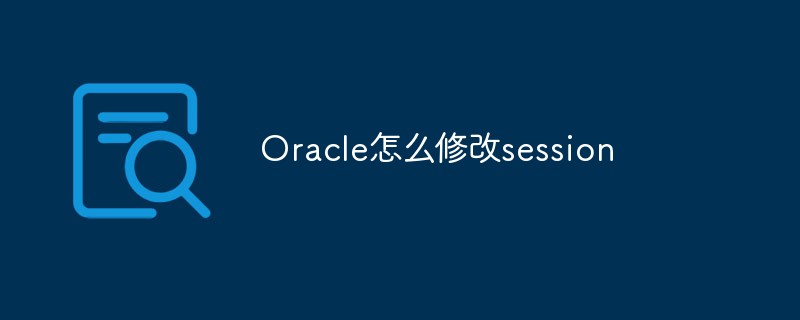Methods to close triggers: 1. Use the "ALTER TRIGGER trigger name DISABLE;" statement to close the trigger with the specified name; 2. Use the "ALTER TABLE table name DISABLE ALL TRIGGERS;" statement to Closes all triggers in the specified data table.

The operating environment of this tutorial: Windows 7 system, Oracle 11g version, Dell G3 computer.
The definition of a trigger means that when a certain condition is established, the statement defined in the trigger will be automatically executed.
Therefore, triggers do not need to be called manually and cannot be called. The triggering conditions of the trigger are actually set when it is defined.
How to turn off oracle triggers
When a trigger is created in Oracle, you may need to disable (turn off) the trigger. Then you can use the ALTER TRIGGER statement to do this.
There are two methods:
1. Close the specified trigger
ALTER TRIGGER trigger_name DISABLE;
Parameters
trigger_name - The name of the trigger to be disabled.
Example:
ALTER TRIGGER orders_before_insert DISABLE;
The trigger named orders_before_insert can be turned off.
2. Close all triggers in the specified table
ALTER TABLE table_name DISABLE ALL TRIGGERS;
Parameters
table_name - the table of triggers to be disabled name.
Example:
ALTER TABLE orders DISABLE ALL TRIGGERS;
All triggers on the table named orders.
Expand knowledge: enable oracle triggers
1. Enable specified triggers on the table
ALTER TRIGGER trigger_name ENABLE;
2. Enable all triggers on the table
ALTER TABLE table_name ENABLE ALL TRIGGERS;
Recommended tutorial: "Oracle Tutorial"
The above is the detailed content of How to turn off oracle triggers. For more information, please follow other related articles on the PHP Chinese website!
 oracle怎么查询所有索引May 13, 2022 pm 05:23 PM
oracle怎么查询所有索引May 13, 2022 pm 05:23 PM方法:1、利用“select*from user_indexes where table_name=表名”语句查询表中索引;2、利用“select*from all_indexes where table_name=表名”语句查询所有索引。
 什么是oracle asmApr 18, 2022 pm 04:16 PM
什么是oracle asmApr 18, 2022 pm 04:16 PMoracle asm指的是“自动存储管理”,是一种卷管理器,可自动管理磁盘组并提供有效的数据冗余功能;它是做为单独的Oracle实例实施和部署。asm的优势:1、配置简单、可最大化推动数据库合并的存储资源利用;2、支持BIGFILE文件等。
 oracle全角怎么转半角May 13, 2022 pm 03:21 PM
oracle全角怎么转半角May 13, 2022 pm 03:21 PM在oracle中,可以利用“TO_SINGLE_BYTE(String)”将全角转换为半角;“TO_SINGLE_BYTE”函数可以将参数中所有多字节字符都替换为等价的单字节字符,只有当数据库字符集同时包含多字节和单字节字符的时候有效。
 Oracle怎么查询端口号May 13, 2022 am 10:10 AM
Oracle怎么查询端口号May 13, 2022 am 10:10 AM在Oracle中,可利用lsnrctl命令查询端口号,该命令是Oracle的监听命令;在启动、关闭或重启oracle监听器之前可使用该命令检查oracle监听器的状态,语法为“lsnrctl status”,结果PORT后的内容就是端口号。
 oracle怎么删除sequenceMay 13, 2022 pm 03:35 PM
oracle怎么删除sequenceMay 13, 2022 pm 03:35 PM在oracle中,可以利用“drop sequence sequence名”来删除sequence;sequence是自动增加数字序列的意思,也就是序列号,序列号自动增加不能重置,因此需要利用drop sequence语句来删除序列。
 oracle怎么查询数据类型May 13, 2022 pm 04:19 PM
oracle怎么查询数据类型May 13, 2022 pm 04:19 PM在oracle中,可以利用“select ... From all_tab_columns where table_name=upper('表名') AND owner=upper('数据库登录用户名');”语句查询数据库表的数据类型。
 oracle查询怎么不区分大小写May 10, 2022 pm 05:45 PM
oracle查询怎么不区分大小写May 10, 2022 pm 05:45 PM方法:1、利用“LOWER(字段值)”将字段转为小写,或者利用“UPPER(字段值)”将字段转为大写;2、利用“REGEXP_LIKE(字符串,正则表达式,'i')”,当参数设置为“i”时,说明进行匹配不区分大小写。
 Oracle怎么修改sessionMay 13, 2022 pm 05:06 PM
Oracle怎么修改sessionMay 13, 2022 pm 05:06 PM方法:1、利用“alter system set sessions=修改后的数值 scope=spfile”语句修改session参数;2、修改参数之后利用“shutdown immediate – startup”语句重启服务器即可生效。


Hot AI Tools

Undresser.AI Undress
AI-powered app for creating realistic nude photos

AI Clothes Remover
Online AI tool for removing clothes from photos.

Undress AI Tool
Undress images for free

Clothoff.io
AI clothes remover

AI Hentai Generator
Generate AI Hentai for free.

Hot Article

Hot Tools

EditPlus Chinese cracked version
Small size, syntax highlighting, does not support code prompt function

MinGW - Minimalist GNU for Windows
This project is in the process of being migrated to osdn.net/projects/mingw, you can continue to follow us there. MinGW: A native Windows port of the GNU Compiler Collection (GCC), freely distributable import libraries and header files for building native Windows applications; includes extensions to the MSVC runtime to support C99 functionality. All MinGW software can run on 64-bit Windows platforms.

SublimeText3 Chinese version
Chinese version, very easy to use

PhpStorm Mac version
The latest (2018.2.1) professional PHP integrated development tool

SublimeText3 Linux new version
SublimeText3 Linux latest version





